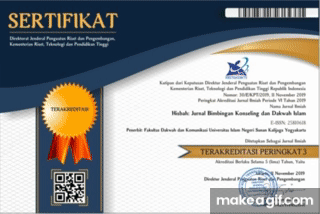POLA BIMBINGAN BELAJAR SISWA TUNARUNGU SAAT PANDEMI COVID-19 DI SLB NEGERI GUNUNGSARI
DOI:
https://doi.org/10.14421/hisbah.2022.191-04Abstract
The purpose of this study was to determine the pattern of tutoring for deaf students during the Covid-19 pandemic at SLB Negeri Gunungsari Baureno Bojonegoro. The researcher uses a qualitative method with a case study approach, the technique of determining the subject is through purposive sampling. Data collection techniques through interviews, observation, and documentation. The results of this study indicate that the pattern of tutoring provided by the teacher to deaf students at SLB Negeri Gunungsari Baureno is in the form of intensive communication, additional subject matter, direction, cooperation with parents, and additional assignments. Tutoring is carried out online and home visit are provided according to the needs of deaf students. Learning assistance through tutoring services was responded to by both the parents and the deaf students. In addition, deaf students show good learning development.
Keywords: covid-19, tutoring, deaf student.
References
Arbayah. (2013). Model Pembelajaran Humanistik. Dinamika Ilmu, 13(2), 205.
Ariani, A., Wahyudi, M., & Rugaiyah. (2019). Inclusive Education: Cooperation Between Class Teachers, Special Teachers, Parents to Optimize Development of Special Needs Childrens. International Journal for Educational and Vocational Studies, 1(5), 396–399. https://doi.org/10.29103/ijevs.v1i5.1616
Awwad, M. (2015). Urgensi Layanan Bimbingan dan Konseling Bagi Anak Berkebutuhan Khusus. Al-Tazkiah: Jurnal Bimbingan Dan Konseling Islam, 4(1), 46–64.
Baharuddin, & Dalle, J. (2019). Transforming Learning Spaces for Elementary School Children with Special Needs. 10(2), 344–365.
Budiningsih, C. A. (2003). Perkembangan Teori Belajar Dan Pembelajaran Menuju Revolusi-Sosiokulturas Vygotsky. Dinamika Pendidikan, 10(1), 1–12.
Burdette, P. J., & Greer, D. L. (2014). Online Learning and Students with Disabilities: Parent Perspectives. Journal of Interactive Online Learning, 13(2), 68–88.
Creswell, J. W. (2015). Penelitian Kualitatif & Desain Riset. Yogyakarta: Pustaka Pelajar
.
Danarti, M. (2010). Perkembangan Psikologi Anak dan Balita. Bandung: Garuda Press.
Dewi, T. N. (2021). Strategi Guru Dalam Mendidik Anak berkebutuhan khusus Pada Masa Pandemi Covid 19 di Paud Alam Mahira Kota Bengkulu. IAIN BENGKULU.
Dubose, T. (2020). When COVID-19 Meets Pandemic Hope : Existential Care of , and in , the Impossible. Journal of Humanistic Psychology, 60(5), 564–570. https://doi.org/10.1177/0022167820944645
Engzell, P., Frey, A., & Verhagen, M. D. (2021). Learning loss due to school closures during the COVID-19 pandemic. Proceedings of the National Academy of Sciences of the United States of America, 118(17). https://doi.org/10.1073/PNAS.2022376118
Hevia, F. J., Tristan, S. V.-L., Velásquez-Durán, A., & del Campo, D. C. M. (2021). Estimation of the fundamental learning loss and learning poverty related to COVID-19 pandemic in Mexico. International Journal of Educational Development, 88. https://doi.org/10.1016/j.ijedudev.2021.102515
Moleong, L. J. (2017). Metodologi Penelitian Kualitatif. Bandung: Remaja Rosdakarya.
Nurhadi. (2020). Teori kognitivisme serta aplikasinya dalam pembelajaran. Jurnal Edukasi Dan Sains, 2(1), 77–95.
Nofindra, R. (2019). INGATAN, LUPA, DAN TRANSFER DALAM BELAJAR DAN PEMBELAJARAN. Jurnal Pendidikan Rokania, IV(1), 21–34.
Rahman, S. A. (2020). Pentingnya Penyediaan Lingkungan Belajar yang Kondusif Bagi Anak Usia Dini Berbasis Kunjungan Belajar di Masa New Normal. Jurnal Ilmiah Tumbuh Kembang Anak Usia Dini, 6(3), 480–487.
Rahmawati, T., Fartiwi, & Fatimah, U. N. (2020). Model Pendampingan Belajar Orang Tua untuk Anak Berkebutuhan Khusus Selama Masa Pandemi. Academica, 4(2), 257–266.
Sabrina, R., Fauzi, & Yamin, M. (2017). Faktor-Faktor Penyebab Rendahnya Motivasi Belajar Siswa Dalam Proses Pembelajaran Matematika Di Kelas V Sd Negeri Garot Geuceu Aceh Besar. Jurnal Ilmiah Pendidikan Guru Sekolah Dasar, 2(4), 108–118.
Saumi, N. N., Murtono, & Ismaya, E. A. (2021). Peran Guru Dalam Memberikan Motivasi Belajar Siswa Sekolah Dasar Pada Masa Pandemi COVID-19. Jurnal Educatio, 7(1), 149–155.
Schultz, J. L., Lieberman, L. J., Ellis, M. K., & Hilgenbrinck, L. C. (2013). Ensuring the Success of Deaf Students in Inclusive Physical Education. Journal of Physical Education, Recreation & Dance, 84(5), 51–56. https://doi.org/10.1080/07303084.2013.779535
Sugiyana, Marhaeni, A., & Candiasa, I. M. (2015). PENGARUH PEMBERIAN LAYANAN BIMBINGAN ARTIKULASI TERHADAP MOTIVASI BELAJAR DAN HASIL BELAJAR IPA PADA SISWA TUNA RUNGU WICARA KELAS VI SLB B NEGERI SIDAKARYA DENPASAR. Jurnal Penelitian Dan Evaluasi Pendidikan Indonesia, 5(1).
Sugiyono. (2011). Metode Penelitian Kuantitatif, Kualitatif, dan R&D. Bandung: Alfabeta.
Suryaningsih, A. (2020). Peningkatan motivasi belajar siswa secara online pada pelajaran animasi 2d melalui strategi komunikasi persuasif. Jurnal Karya Ilmiah Guru, 5(1), 9–15.
Tohirin. (2013). Bimbingan dan Konseling di Sekolah dan Madrasah (Berbasis Integrasi). Jakarta: Rajawali Pers.
Wahyuni, E., Nurihsan, J., & Yusuf, S. (2018). Kesejahteraan Mahasiswa: Implikasi Terhadap Program Konseling Di Perguruan Tinggi. Jurnal Bimbingan Konseling, 7(1), 96–106. https://doi.org/10.21009/insight.071.08
Yusuf, S., & Juntika, A. N. (2012). Landasan Bimbingan dan Konseling. Bandung: Remaja Rosdakarya.

Downloads
Published
Issue
Section
License
Authors who publish with this journal agree to the following terms:
- Authors retain copyright and grant the journal right of first publication with the work simultaneously licensed under a Creative Commons Attribution License that allows others to share the work with an acknowledgement of the work's authorship and initial publication in this journal.
- Authors are able to enter into separate, additional contractual arrangements for the non-exclusive distribution of the journal's published version of the work (e.g., post it to an institutional repository or publish it in a book), with an acknowledgement of its initial publication in this journal.
- Authors are permitted and encouraged to post their work online (e.g., in institutional repositories or on their website) prior to and during the submission process, as it can lead to productive exchanges, as well as earlier and greater citation of published work.











